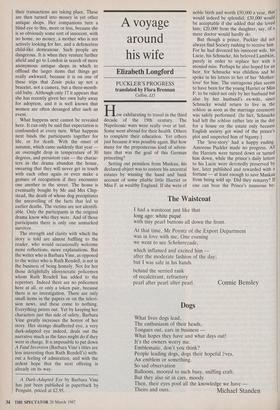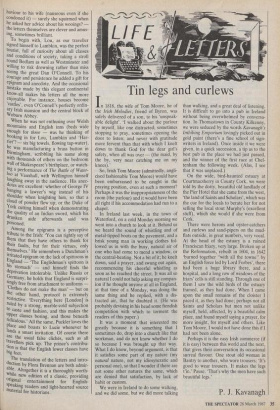A voyage around his wife
Elizabeth Longford
PUCKLER'S PROGRESS translated by Flora Brennan
Collins, f15
How exhilarating to travel in the third decade of the 19th century. The Napoleonic wars were really over at last. Some went abroad for their health. Others to complete their education. Yet others just because it was possible again. But how many for the preposterous kind of adven- ture that was the goal of this German princeling?
Setting out penniless from Muskau, his declared object was to restore his ancestral estates by winning the hand and bank account of some pliable little Harriet or Miss F. in wealthy England. If she were of noble birth and worth £50,000 a year, that would indeed be splendid; £30,000 would be acceptable if she added that she loved him; £20,000 from the daughter, say, of a mere doctor would hardly do. But though a prince, Puckler did not always find Society rushing to receive him. For he had divorced his innocent wife, his Lucie, his Schnucke, his beloved Lambkin, purely in order to replace her with a monied miss. Perhaps he also hoped for an heir, for Schnucke was childless and he spoke in his letters to her of her 'Mother- love' for him. The outrageous plan seems to have been for the young Harriet or Miss F. to be ruled not only by her husband but also by her husband's ex-wife, since Schnucke would return to live in the schloss as soon as the marriage ceremonY was safely performed. (In fact, Schnucke had left the schloss rather late in the day for a house on the estate only because English society got wind of the prince's plot and suspected him of bigamy.) The love-story' had a happy ending. Amorous Puckler made no progress. All the Harriets were turned down or turned him down, while the prince's daily letters to his Lucie were devotedly preserved by her, later published and rewarded with a fortune — at least enough to save Muskau from being sold up. Did they remarry? If one can bear the Prince's nauseous be haviour to his wife (nauseous even if she condoned it) — surely she squirmed when he asked her advice about his wooings? — the letters themselves are clever and amus- ing, sometimes brilliant.
To begin with, Lou, as our traveller Signed himself to Lambkin, was the perfect tourist, full of curiosity about all classes and conditions of society, taking a stroll round Bedlam as well as Westminster and Willing to risk drowning rather than miss seeing the great Dan O'Connell. To his courage and persistence he added a gift for epigram and anecdote. And the occasional mistake made by this elegant continental know-all makes his letters all the more enjoyable. For instance, houses become 'castles', even O'Connell's perfectly ordin- ary Irish mansion and the central block of Woburn Abbey. When he was not enthusing over Welsh mountains and English inns (beds wide enough for three — was he thinking of booking in for Lou, Lambkin and 'Har- riet'? — six big towels, flowing tap-water), he was manufacturing a brass button in Birmingham, scribbling his name along With thousands of others on the bedroom all of Shakespeare's birthplace, or watch- ing a performance of The Battle of Water- loo at Vauxhall, with Wellington himself laughing away in the audience. His anec- dotes are excellent: whether of George IV banging a lawyer's wig instead of his Shoulder when knighting him, so that a Cloud of powder flew up; or the Duke of York cutting himself when demonstrating the quality of an Indian sword, which his drunken aide afterwards said was poisoned.
Among the epigrams is a perceptive tribute to the Irish: 'You can rightly say of them that they have others to thank for their faults, but for their virtues, only themselves. He remembers a Dutchman's irritated epigram on the lack of spittoons in England — 'The Englishman's spittoon is his stomach' — and himself finds the deprivation intolerable. Unlike Russia or Germany, he holds that England is surpri- singly free from attachment to uniforms — 'Clothes do not make the man' — but on the other hand, protocol is extremely restrictive. 'Everything here [London] is ruled by a strong, marble-cold subjection to caste and fashion, and this makes the uPper classes boring, and those beneath ridiculous.' All the same, Puckler loves the Place and boasts to Lucie whenever he lands a smart invitation. Of course there are the usual false clichés, such as all travellers pick up. The prince's contribu- tion is that the English lower classes have big feet.
The translation of the letters and intro- duction by Flora Brennan are both admir- able. Altogether it is a thoroughly worth- while new edition of a classic, providing Original entertainment for English- speaking readers and light-hearted source material for historians.



















































 Previous page
Previous page